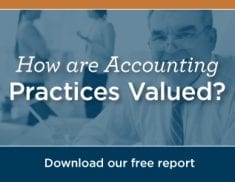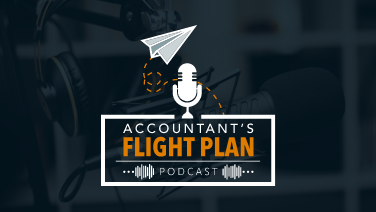
Why are accounting firm values based on a multiple of annual revenue instead of a multiple of annual cash flow to owner?
“Accounting practices are worth x times gross revenue.”
This is a belief that permeates the accounting profession as strongly as anything we have seen. This has been true for a very long time, and many find that to be a bit strange. It’s true in several industries as well, such as financial services. In contrast, almost all other small businesses are valued based on a multiple of net cash flow to owner. For many small businesses, that multiple is approximately 2.5 times cash flow to owner. The multiple for service businesses is typically less, more like 1.5 to 2 times cash flow to owner depending on size and other factors. Therefore, if we accountants were like everyone else, we would value our accounting practice at 1.5 to 2 times cash flow to owner. There are a host of factors that will make a practice sell for more or less than the normal profit.
I believe the multiple of revenue approach has held up for so long because the cash flow to owner depends mainly on who the owner is. We’ve seen this over and over. If a CPA has been running a practice at 50% cash flow to owner, then when he or she buys another accounting practice it will strongly, over a few years, trend back to that level of profitability. We’ve seen that work both ways as well. This means that if a CPA buys a highly profitable firm (65% cash flow) or lower profitability (say 25%) it will tend to end up back at the 50% mark (unless the buyer adopts the previous owner’s good habits). My theory is that it’s primarily a function of pricing, accounting standards, and management habits. Another big factor is synergy. Firms that acquire neighboring practices often eliminate duplicate costs, increase specialization and cross-selling opportunities. All of which means a lot more of the top-line financial revenue acquired ends up on the bottom line.
That said, profitability does influence price. As you look at practices, it’s important to consider your own equity, synergies, pricing and leadership and then create projections (and your offer) accordingly.
About Brannon Poe: Brannon is the founder of Poe Group Advisors and has been facilitating successful accounting practice transitions throughout the US and Canada since 2003. Brannon started his career in public accounting as an auditor with Ernst & Young before working for several years in auditing and tax preparation for the regional firm of Elliott, Davis & Company. He is the author of “Accountant’s Flight Plan: Best Practices for Today’s Firms” (published by the AICPA and CPA Canada), “On Your Own: How to Start Your Own CPA Firm,” as well as multiple blogs and the “Accountant’s Flight Plan” podcast.
Follow us on Twitter @PoeGroupAdvisor and LinkedIn





